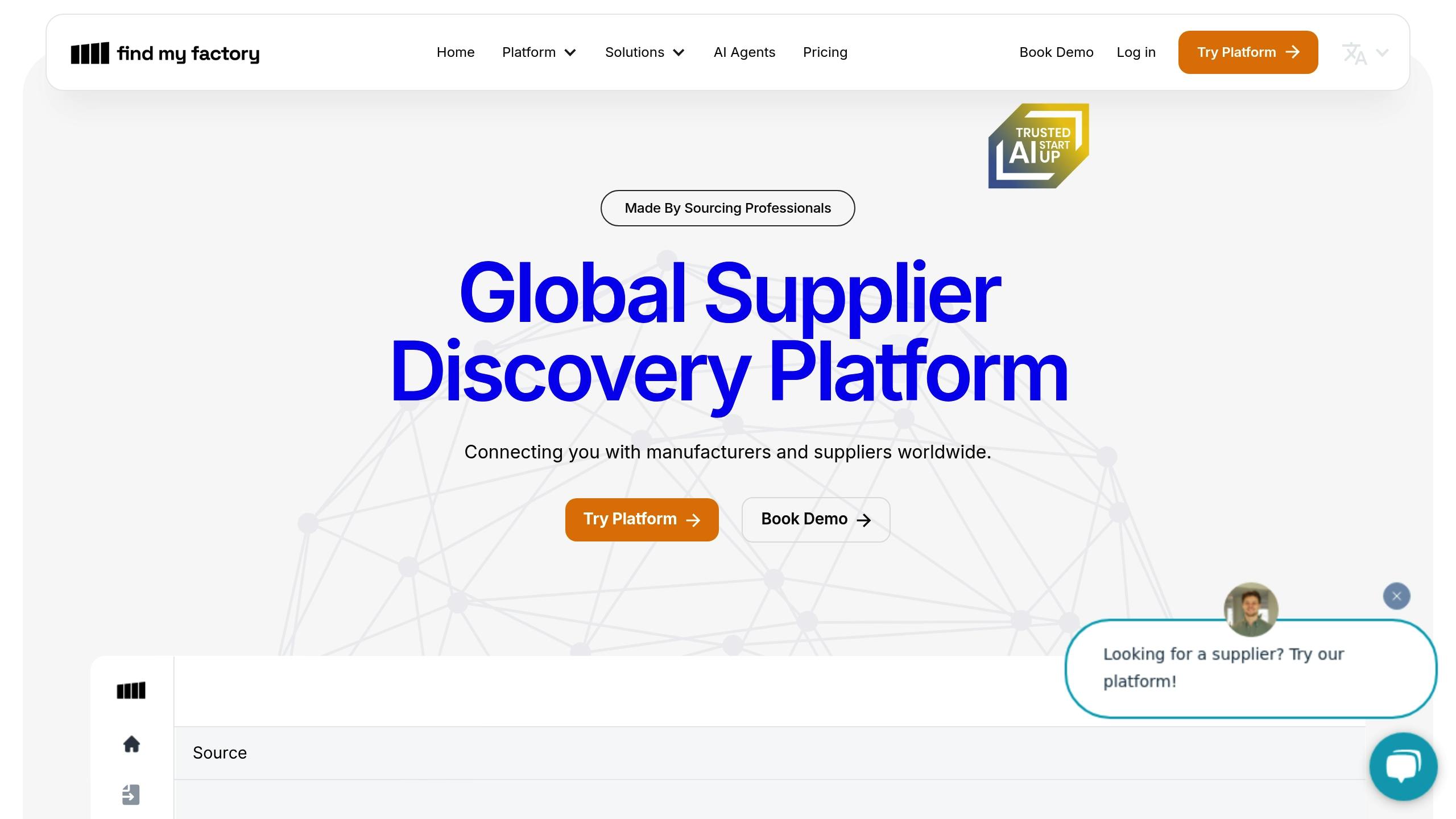Main Pages
AboutPricingSecurityCareerCustomersContactBlogFeatures
Monitor & EnrichDiscover & SourceRFI & EngageOur Socials
LinkedinLegal
Terms of UseMay 9, 2025
Learn how to efficiently find reliable suppliers for your retail business using clear criteria, AI tools, and effective evaluation techniques.
Articles

Finding the right suppliers is critical for your retail business. Here's a quick guide to help you:
Quick Tip: Use a supplier rating system to objectively compare options and ensure the best fit for your business needs.
Before diving into supplier searches, clearly outline your requirements. A recent study shows that 72% of small and medium-sized businesses struggle with unpredictable delivery times. Having well-defined criteria can help you avoid similar challenges.
Start by specifying the exact product details that align with your retail needs. With 77% of organizations adopting ethical sourcing policies, it’s smart to include eco-friendly practices in your specifications.
Here’s how many retailers structure their requirements:
Requirement CategoryKey ElementsWhy It’s ImportantQuality StandardsMaterial specs, durability tests, certificationsGuarantees consistent product qualityOrder VolumeMinimum order quantity (MOQ), reorder pointsHelps with inventory controlDelivery TermsLead times, shipping methods, delivery schedulesKeeps your supply chain running smoothlyComplianceSafety standards, ethical sourcing, sustainabilityMeets legal and ethical guidelines
Use tools like predictive analytics to anticipate demand more accurately. As Stefan Gergely highlights, total ownership cost includes factors like storage fees, lead times, and seasonal changes. Once you’ve nailed down product specs and order volumes, you can fine-tune your criteria further.
After defining your specifications, focus on criteria that ensure a dependable supplier relationship. Factors like location and reliability are critical - especially since sourcing from China often involves more variable lead times compared to the US.
"In my experience as a supply chain manager, finding the balance between quality and cost requires a strategic perspective. I prioritize Total Cost of Ownership (TCO) over just the unit price."
Here are three key areas to prioritize when evaluating suppliers:
"The lowest price is very often not the best buy. When assessing cost-effectiveness, buyers must evaluate cost vs. value. Value includes product quality, reliability, customer service, and flexibility".
Once you've established clear supplier requirements, AI tools can make your search faster and more efficient. These tools use advanced algorithms to analyze supplier data, saving you time and effort.
AI-powered platforms evaluate supplier data based on your specific needs. This approach powers tools like Find My Factory.
FeatureAdvantageOutcomeSmart SearchMatches multiple criteria at onceCuts search time drasticallyData EnrichmentKeeps supplier info up to dateEnsures reliable details

Find My Factory connects businesses with over 10 million suppliers worldwide. It’s designed to cater to companies of all sizes.
Here’s what it offers:
To make the most of your supplier search, consider these tips:
Find My Factory offers several pricing plans, starting from $649/month for small retailers up to enterprise-level solutions for larger businesses. All plans include unlimited searches and secure database access, with higher tiers offering advanced collaboration and export features.
Online directories offer a straightforward way to connect with verified retail suppliers.
Here are some of the leading US directories:
DirectoryFeaturesKey CategoriesWholesale CentralFree to use, verified usersApparel, electronics, home goodsTopTenWholesaleAdvanced search filters, supplier ratingsGeneral merchandise, specialty itemsWorldwide BrandsLifetime access, BBB A+ ratedUS/Canadian suppliers, verified vendors4WholesaleUSAFocus on American-made productsDomestic manufacturing, artisanal goods
"The Worldwide Brands Directory of Certified Wholesalers is your Premier Source for genuine, reliable wholesale suppliers and dropshippers"
For global sourcing, extra steps like verifying suppliers and assessing costs are essential.
When sourcing internationally, stick to well-known platforms with strong verification systems. Keep in mind that logistics and costs can vary significantly. For example, US suppliers typically deliver within 3–5 business days, while international shipments can take 2–4 weeks. Customs, import duties, and higher shipping fees may add 10–25% to your total costs.
Once you've identified potential suppliers through directories or marketplaces, take time to verify their credibility.
Here’s how you can check their background:
Keep a record of all these checks for future reference.
Trade shows provide a hands-on way to evaluate suppliers and connect directly with industry professionals, offering opportunities that go beyond digital searches.
These events are key for retailers looking to strengthen supplier relationships and assess products firsthand. With the global retail sector expected to surpass $31 trillion by 2025, trade shows are becoming an increasingly important part of business strategy.
Here are two standout trade shows for retailers:
Trade ShowDetailsKey BenefitsASD Market WeekOver 1,800 vendors at the Las Vegas Convention Center (March 2025)Discover high-margin products and enjoy hotel rates starting at $64/nightNRF's Big ShowOrganized by the National Retail Federation in New York CityGain insights into the industry and expand your network
ASD Market Week holds the title of the largest B2B wholesale trade show in the U.S. It will take place in March 2025 at the Las Vegas Convention Center, covering the North, South Lower, and South Upper Halls.
"ASD is our favorite show to attend because it covers such a broad range of categories and price points and allows us to expand our supplier range significantly. It is a fantastic resource, especially for our market."
Pre-Show Preparation
At the Event
"A trade show environment allows retailers to see product in person, establish what's trending in their marketplace and get comprehensive product information in one contained location. It is also a unique opportunity for them to build relationships with their vendors, with their peers and within one's store team."
Some retailers hesitate to attend trade shows due to travel costs, but skipping these events can lead to greater expenses in the long run. Experts Rich Kizer and Georganne Bender explain:
"Over the years we have spoken to retailers who have avoided trade shows for a variety of reasons, but one reason that is fairly common is due to the expense of travel to attend. What they don't realize, however, is that it actually costs them more by not attending."
Trade shows offer direct access to product evaluations, supplier negotiations, and valuable market insights.
Once you've identified potential suppliers, it's time to evaluate and choose the most reliable ones. This step is especially important for retail businesses that operate with tight margins and high-quality expectations.
A well-structured supplier evaluation process can significantly impact procurement performance, accounting for 57.1% of its success.
CriteriaWeightWhat to EvaluateQuality30%Product standards, defect rates, certificationsCost25%Pricing, payment terms, volume discountsDelivery20%Lead times, shipping reliability, flexibilityService15%Communication, technical support, issue resolutionSustainability10%Compliance with environmental and ethical standards
Rate each criterion on a scale of 1–5, multiply by its weight, and add the results. This scoring system helps you objectively compare suppliers.
"This ensures that the best vendors are selected based on their abilities, rather than personal connections or biases." - Oliver Machingauta, Procurement Specialist
After scoring, move on to verifying these evaluations through a series of checks.
Between 2018 and 2020, 47% of companies experienced fraud, with 39% of cases involving vendors, suppliers, customers, or hackers. To avoid such risks, follow these steps:
Once you've chosen a supplier, establish clear contracts to ensure mutual success. A great example is Target’s partnership with Apple to launch "Apple at Target" mini-stores, which highlights how solid agreements can benefit both parties.
"Suppliers appreciate it when we show interest in their process, lead times, and where and how they source raw materials... Merchants that take the time to understand the ins and outs of their suppliers are going to collaborate better and have a more constructive relationship overall." - Yedra Lopez Gragera, business operations at OpenStore
Key contract elements to include:
Taking the time to build strong supplier relationships and drafting clear agreements can set the foundation for long-term success.
Reliable suppliers are key to driving retail growth. Thanks to advancements like AI, the time spent searching for suppliers has dramatically dropped - from 160 hours to just 8 hours.
Platforms such as Find My Factory, which boasts a database of over 10 million supplier records, showcase how technology is reshaping traditional sourcing practices. By combining AI with established methods, retailers have managed to cut procurement time by 50%. PepsiCo's approach highlights this shift:
"Driven by the need to find suppliers aligned with its sustainable sourcing initiatives, PepsiCo requires access to the most accurate and up-to-date supplier data available"
Still, 82% of procurement professionals worry about the accuracy of supplier data. To address this, retailers can adopt structured evaluation systems, use AI tools for initial screenings, and ensure thorough verification. This balanced strategy not only strengthens supply chains but also lays the groundwork for sustainable growth in the retail sector.
Insights & Ideas